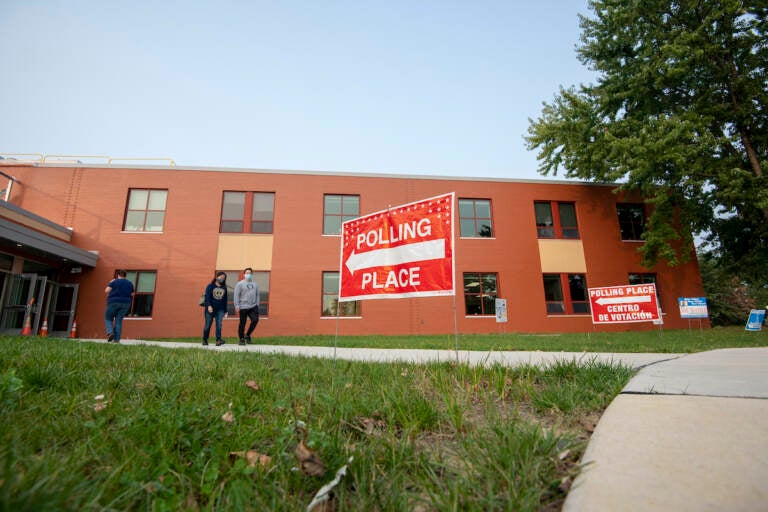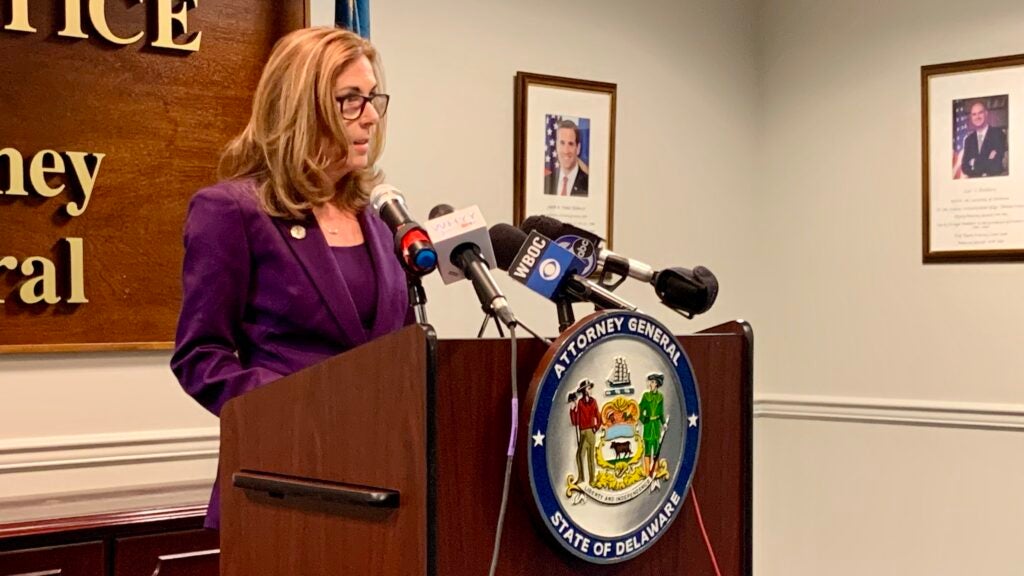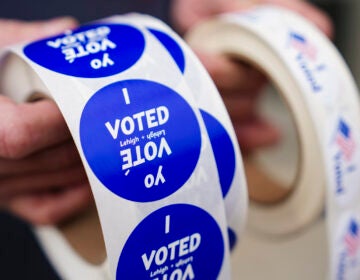Delaware attorney general vows to fight court ruling that halts early voting and permanent absentee voting
Attorney General Kathy Jennings said she’ll ask the Delaware Supreme Court to stay the ruling narrowing access to the voting booth.
Listen :56
File photo: Voters head to the polls at Claymont Elementary in Claymont, Del., Tuesday, Sept. 15, 2020. (AP Photo/Jason Minto)
From Philly and the Pa. suburbs to South Jersey and Delaware, what would you like WHYY News to cover? Let us know!
This story was supported by a statehouse coverage grant from the Corporation for Public Broadcasting.
The Delaware Department of Justice will move swiftly to appeal Friday’s Superior Court decision that struck down early voting and permanent absentee voting. Attorney General Kathy Jennings called the judgment “politically extreme.”
“We believe that the ruling is having the net effect of sowing confusion ahead of a major election, threatening grave consequences for the people of this state,” she said.

The Legislature passed a law in 2019 that allowed 10 days of early voting beginning 2022. Jennings said 56,000 Delawareans have taken advantage of early voting, something that is unlikely at this point to be an option this year.
A lawsuit was filed in 2022 by the Public Interest Legal Foundation on behalf of an inspector of elections and Senate Minority Leader Gerald Hocker, a Republican, who challenged the state’s early voting and absentee voting laws.
Superior Court Judge Mark Conner denied a motion by state Election Commissioner Anthony J. Albence and the Delaware Department of Elections, to dismiss a complaint that argued Delaware’s early voting and permanent absentee voting statutes violated the First State’s constitution.
Conner ruled last week that lawmakers overreached in their authority by passing these statutes instead of amending the constitution. He sided with the plaintiffs, who argued that the constitution only allows the general election to be held on one day and that “granting indefinite absentee voting to those who cannot vote in a single election” goes too far.
Hocker said he and his party support early voting and plan to introduce a constitutional amendment this week to reinstate early voting that satisfies the court’s concerns. Amendments must be approved by the General Assembly twice in two separate sessions and be signed by the governor to take effect.
“We are 100% in favor of early voting, but doing it in the right way,” Hocker said. “No way am I against early voting.”
Jennings said she’ll ask the Delaware Supreme Court for a stay of Conner’s decision. She said only the general election is affected, not the April presidential primaries. It’s unclear how much the state’s primary election in September could be affected if the Supreme Court declines to grant a stay. DOJ plans to argue the word “election” includes early voting and permanent absentee voting.
The ruling is the latest in a spate of decisions limiting access to the voting booth. In 2022, a court also struck down same-day registration and no-excuse absentee voting.
Jennings said the elimination of permanent absentee voting, which allows people who are disabled or in the military deployed overseas to not have to apply each time for a mail in ballot, hits the First State’s most vulnerable the most.
“Our military families, Delawareans who volunteer and are sent all over the globe in service of our nation, are now being deleted from the permanent absentee list,” she said “This extreme Republican minority lawsuit has now successfully disenfranchised our state’s most vulnerable and most noble voters, veterans, disabled caregivers and working people, 21,000 of them in the case of permanent absentee voters.”
A spokesperson for the Delaware Department of Elections said deployed military personnel and overseas voters who were on the permanent absentee voter list will now have to apply for an absentee ballot every election cycle.
The permanent absentee law was passed by lawmakers in 2010 and Jennings and Democratic lawmakers point out that Hocker voted for the legislation at the time. He was also a co-sponsor of a bill signed into law in 2009 that would permit military and overseas voters to automatically receive absentee ballot applications and ballots electronically.
Hocker said that he does not support the concept now.
“I don’t like no-excuse absentee voting or mailing absentee voting, I’m totally against it,” he said. “But, let’s do it the right way and make it a constitutional amendment, so we’re not breaking our own constitution.”
A constitutional amendment to possibly enshrine permanent absentee voting was approved once by both the House and Senate in 2019. But some Democrats blame Republican House members, such as Rep. Mike Smith for switching to “no” votes on the second leg of the attempt to pass the amendment through both chambers.
Smith said in a statement that the amendment had a “poison pill” that allowed future changes on voting to be made with a simple majority vote.
“[Democrats] do not want all voices included in the governing process,” his statement said. “They preach equity, they preach inclusion, but they don’t mean it when it comes to governing.”
Democratic Sen. Bryan Townsend said he takes issue with Smith’s characterization.
“I welcome examples of how the Democratic majorities, super majorities in our legislature haven’t been listening to all voices as we make our decisions,” he said. “And it’s ironic for him to level those accusations when literally, his party is the one trying to silence people’s ability to reliably get to the polls.”
Another constitutional amendment to add permanent absentee voting into the Delaware constitution in 2023 passed the Senate on its first leg of its two cycle movement through the legislature and appears ready to be voted in the House.

Get daily updates from WHYY News!
WHYY is your source for fact-based, in-depth journalism and information. As a nonprofit organization, we rely on financial support from readers like you. Please give today.







